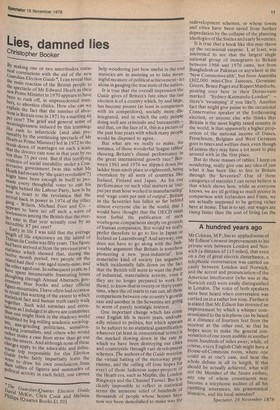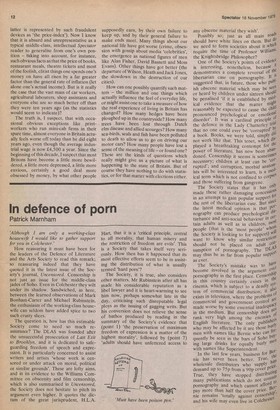Lies, damned lies
Christopher Booker
8Y 'flaking one or two unorthodox statistical correlations with the aid of the new Guardian Election Guide*, I can reveal that the main reaction of the British people to the spectacle of Mr Edward Heath as their new Prime Minister in 1970 appears to have been to rush off, in unprecedented numbers, to abortion clinics. How else can we explain the fact that the number of abortions in Britain rose in 1971 by a startling 46 Per Cent? The grief and general sense of Meaninglessness induced by this lemminglike rush to infanticide (and also Presumably by the continuing spectacle of Mr Heath as Prime Minister) led in 1972 to the break-down of marriages on such a scale that the divorce rate rose in that year by no less than 75 per cent. But if this terrifying evidence of social instability under a Conservative government (was this what Mr Heath had meant by 'the quiet revolution'?) might have been enough in itself to persuade every thoughtful voter to cast his weight behind the Labour Party, how is he now to react to the revelation that the arrival back in power in 1974 of the other gang — Wilson, Michael Foot and Co. — a, PPears to have set off such a wave of lawlessness among the British that the murder rate in that year actually rose by an incredible 87 per cent? , Early in life I was told that the average ,,,,let!gth of life expectancy on the island of ristan da Cunha was fifty years. This figure had been arrived at from the previous year's statistics which showed that, during the twelve month period, two people on the Island had died one aged ninety-nine, and thhe other aged one. In subsequent years, as I ,ave spent innumerable frustrating hours Noughing through Annual Abstracts, government blue books and other official ,igure-mountains, I have often had occasion n recall this warning of the extent to which s' tatistical fact and human truth rarely walk ,telether. Such wild surmises and corretions as I indulged in above are commoner an one might think in the shadowy world Thabited by log-rolling academic sociologsts, axe-grinding politicians, sensation e r ekillg journalists, and others who would .ather make a case from straw than go out etna_to the streets. And although none of these charges apply to the admirable and indusr,leus trip responsible for this Election v (who fairly impartially leave the oter to draw his own conclusions from their tables of figures and summaries of Political activity in each field), one cannot t7ire Guardian 'Quartet Election Guide McKie, Chris Cook and Melanie ‘`iiPs (Quartet Books £1.50) help wondering just how useful in the end statistics are in assisting us to take mean ingful measure of political achievement —let alone in gauging the true state of the nation. It is true that the overall impression the Guide gives of Britain's fate since the last election is of a country which, by and large, has become poorer (at least in comparison with its competitors), socially more dis integrated, and in which the only people doing well are criminals and bureaucrats — and that, on the face of it, this is a picture of the past four years with which many people would be disposed to agree. But what are we really to make, for instance, of those wonderful 'league tables' showing Britain's dismal performance in the great international growth race? Between 1961 and 1976 we slipped down the ladder from ninth place to eighteenth, being overtaken by all sorts of countries like Iceland, Finland and Japan. As for our performance on such vital matters as 'out: put per man hour worked in manufacturing and 'wage costs per unit of output', Britain in the Seventies has fallen so far behind almost everyone else in the world, that I would have thought that the OECD must soon forbid the publication of such woebegone comparisons simply on grounds of human compassion. But would we really prefer therefore to go to live in Japan or Iceland or Luxembourg? And anyway, one does not have to go along with the fashionable argument that Britain is somehow pioneering a new 'post-industrial', less materialist kind of society (an argument which incidentally falls down on the fact that the British still seem to want the fruits of industrial, materialistic activity, even If they are no longer prepared to work for them), to know that in twenty or thirty years time, when the oil starts to run out, all these comparisons between one country's growth rate and another in the Seventies are going to seem of purely nostalgic interest. One important change which has come over English life in recent years, undoubt edly related to politics, but which appears to be subject to no statistical quantification whatever (at least in conventional terms) is the marked slowing down in the rate at which we have been destroying our cities and countryside through vast development schemes. The authors of the Guide mention the virtual halting of the motorway programme, and the calling off (one hopes for ever) of those ludicrous super-projects of the Heath era, such as Maplin, the London Ringways and the Channel Tunnel. But it is clearly impossible to reflect in statistical terms the immense relief of hundreds of thousands of people whose houses have now not been demolished to make way for redevelopment schemes, or whose towns and cities have been saved from further depredation by the collapse of the planning ideologies of the Sixties and early Seventies.
It is true that a book like this may throw up the occasional surprise. I, at least, was interested to see that the largest single national group of immigrants to Britain between 1966 and 1976 came, not from Bangladesh or Pakistan or anywhere in the 'New Commonwealth', but from Australia (302,000 mini-Clive Jameses, Germaine Greers, Bruce Pages and Rupert Murdochs, pouring over here in their Dormi-vans marked 'Sydney-Katmandu-London' — there's 'swamping' if you like!). Another fact that might give pause to the occasional Conservative speaker at the forthcoming election, or anyone else who thinks that Britain is the most highly taxed country in the world, is that apparently a higher proportion of the national income of Danes, Frenchmen, Belgians and West Germans goes in taxes and welfare dues, even though of course they may have a lot more to play around with in the first place.
But do these masses of tables, I keep on wondering, really give one any idea of just • what it has been like to live in Britain through the Seventies? One of those categories of statistics I can never believe is that which shows how, while as everyone knows, we are all getting so much poorer in comparison with Icelanders and Finns, we are actually supposed to be getting richer here at home. That is to say, our wages are rising faster than the cost of living (as the latter is represented by such fraudulent devices as 'the price-index'). Now I know that it is absurd and unrepresentative as a typical middle-class, intellectual Spectator reader to generalise from one's own position — taking into account, for instance, such obvious facts as that the price of books, restaurant meals, theatre tickets and most of the foolish, elitist things one spends one's money on have all risen by a far greater factor than the general rate of inflation (let alone one's actual income). But is it really the case that the vast mass of car workers, agricultural labourers, shop assistants and everyone else are so much better off than they were ten years ago (as the statistics would seem to indicate)?
The truth is, I suspect, that with occasional obvious exceptions like printworkers who run mini-cab firms in their spare time, almost everyone in Britain actually feels worse off today than he did eight years ago, even though the average industrial wage is now £4,500 a year. Since the beginning of this decade, I suspect that most Britons have become a little more bewildered, a little more depressed, a little more envious, certainly a good deal more obsessed by money, by what other people supposedly earn, by their own failure to keep up, and by their general failure to make ends meet. Many things about our national life have got worse (crime, obsession with gossip about media 'celebrities', the emergence as national figures of men like Alan Fisher, David Basnett and Moss Evans). Other things have got better (the departure of Wilson, Heath and Jack Jones, the slowdown in the destruction of our cities).
How can one possibly quantify such matters — the million and one things which actually influence the feel of everyday life, or might assist one to take a measure of how the real experience of living in Britain has changed? How many hedges have been ploughed up in the countryside? How many trees have been lost through Dutch elm disease and allied scourges? How many sea-birds, seals and fish have been polluted to death to allow us to go on driving our motor cars? How many people have lost a sense of the meaning of life —or found one? These are the kinds of questions which really might give us a picture of what is happening to the state of Britain. But of course they have nothing to do with statistics, or for that matter with elections either.



































 Previous page
Previous page